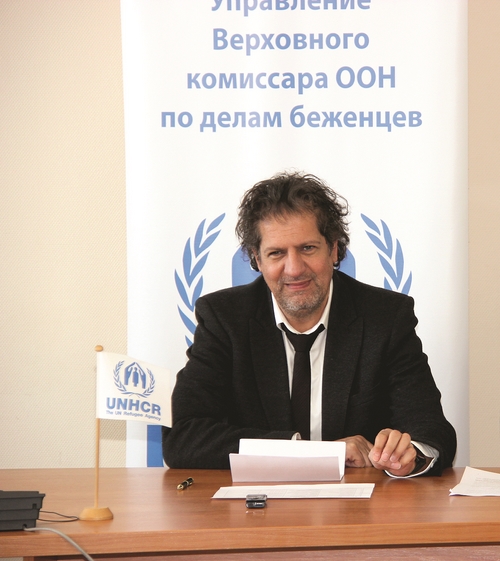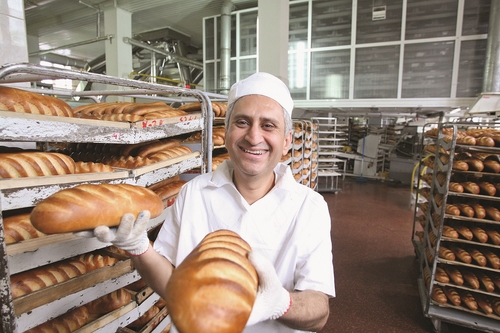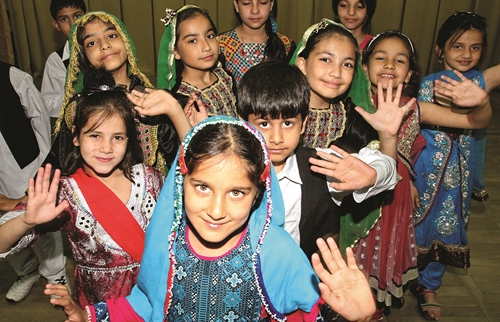In recent times, the volume of expulsions and the number of asylum-seekers has grown significantly. A decade ago, around 38 million individuals were forcibly displaced worldwide as a result of persecution, conflict, generalized violence, or human rights violations. By the end of 2013, this number amounted to some 51 million, according to world statistics. The number of conflicts has risen while old crises remain unsettled. Accordingly, the need for humanitarian aid has steadily risen.

Jean Yves Bouchardy
It’s hardly possible to remain optimistic regarding a change in this trend since few possibilities exist to resolve or prevent crises at an international level. Such factors as population growth, climate change, and lack of food and water aggravate the humanitarian situation. Importantly, the right to shelter (with some exceptions) is widely respected; most of those in need receive protection against conflict and persecution.
Civil wars in Syria and Iraq have led to humanitarian disaster. Is the international community coping with its responsibility to care for those in need? Humanitarian donors’ contribution is great but need exceeds the ability to satisfy even a small share. The Syrian conflict is escalating while neighbouring countries are feeling the strain of huge numbers of refugees. To support those states accepting refugees is essential, since the burden on infrastructure — especially hospitals and schools — and on state budgets — is heavy. To stabilise the situation, co-operative development is vital. Belarus has long offered shelter to those in need and continues this worthy tradition; today’s Belarusians are eager to render help, demonstrating great public sympathy.
Of course, the issue goes beyond a mere ‘bed for the night’: it’s important to realise the full scope of the challenge of accepting an increasing number of refugees.
This issue hosts an interview with Jean Yves Bouchardy, the Representative of the United Nations High Commissioner for Refugees in Belarus:
What does UNHCR do in Belarus?
UNHCR stands for the United Nations High Commissioner for Refugees. It is a UN Refugee Agency whose primary purpose is to safeguard the rights and well-being of refugees. The other persons of concern to UNHCR are stateless people, internally displaced persons, returnees, asylum-seekers.
The UNHCR Office in Belarus was established in 1995. The role of UNHCR in the country is working with the government on improving international protection regime in Belarus, with a particular focus on enhancing the quality of state refugee status determination procedure.
UNHCR also places a great emphasis on integration of recognised refugees. Through its partner NGOs, UNHCR provides emergency/one-time and monthly financial assistance to the most vulnerable refugees and asylum-seekers, offers assistance with gainful employment via vocational and language training, facilitates individual entrepreneurship among refugees. UNHCR also carries out various public information activities to make the public opinion receptive towards the integration of refugees.
What is the situation with refugees in Belarus?
For many years, the situation has been quite stable: ~150 persons were applying for asylum in Belarus in 2010-2012. The figures have changed in 2013 when due to increase of asylum-seekers from Syria the number of claimants amounted to 208 individuals. And in 2014 there was fourfold increase as a result of the crisis in Ukraine and continuing instability in Syria — 867 foreigners sought asylum in Belarus (including 663 nationals of Ukraine, 95 — Syria and 34 — Afghanistan). So you can see that the number of asylum-seekers has exploded.
You have probably noticed that I am using different words while speaking about individuals whom UNHCR works with in Belarus. Let me provide some additional explanations in order everybody clearly understands whom we are speaking about.
Everybody knows the word ‘refugee’ which is frequently used in mass media. In its general meaning, it covers all categories of foreigners whom UNHCR works with. But this is what lies on the surface. If we go a bit further, we will come to two specific groups of UNHCR beneficiaries. They are ‘asylum-seekers’ or foreigners who had just arrived in the country, applied for asylum and are now awaiting decision on their asylum claim, and those who have already received protection — ‘refugees’ or ‘recognised refugees’. In Belarus context, the latter is to be referred to people whom the Government of Belarus granted one out of two available forms of protection — refugee status or complementary protection. Here, the main difference is in foreigner’s status, i.e. status of a person who applied and does not have decision versus status of a person who got positive reply. Otherwise we can in general call everybody refugees; as UNHCR’s doctrine says, a person does not become a refugee as a result of his/her recognition as such, but is recognised as a refugee due to the fact that s/he is a refugee.
Finally, I would like to add that there are almost 6,500 stateless persons residing in Belarus.
Who can address your organisation for help?
In short, anybody can address our organisation as long as a person is afraid of return to his/her country and would like to seek and receive asylum. Yes, we use refugee definition in order to decide on case-by-case basis whether particular person is entitled to UNHCR assistance or not (main criteria: a foreigner or a stateless person outside his/her country who has well-founded fear of being persecuted in his/her country for certain reasons — race, nationality, religion, political opinion and membership in a particular social group — and inability or unwillingness to avail him/herself of the protection of his/her country), but this procedure takes time. What we are to do in the very beginning is to meet a person, listen to him/her and help to apply for asylum in Belarus (if s/he wants). And, of course, to provide him/her with as much information as possible about his/her rights in the country and possible outcomes of application for asylum.
What I have just said is a snapshot, in practice a foreigner has to undergo special procedure, we call it refugee status determination, which envisages formal application for asylum to competent state authority, provision of documents and evidence supporting asylum claim during the interview, and, finally, decision of state authority dealing with refugees. In Belarus, this is competence of the Ministry of Internal Affairs, namely its Department on Citizenship and Migration (DCM).

A Syrian refugee, employed in OJSC “Vitebskkhlebprom” within the framework of a joint project of UNHCR and Vitebsk Regional Executive Committee
DCM can issue positive or negative decision. I am articulating this as everybody has to understand that application for asylum does not mean automatic provision of protection. From our side we are monitoring individual cases; if UNHCR sees that particular asylum claim really deserves refugee status or complementary protection, but authorities tend to deny protection, we are able to intervene: express our concerns, transfer information supporting positive decision and, if an asylum-seeker was finally rejected, provide UNHCR-paid advocate who will represent the person in the court during appeal stage.
What kind of assistance can you provide to refugees?
UNHCR provides assistance to refugees and other persons of concern primarily through its partner organisations. There are 4 major NGOs that we fund and cooperate with.
Our largest partner is Belarusian Red Cross, which is responsible for providing social aid and humanitarian assistance. Here, the most vulnerable asylum-seekers and refugees may receive food and hygienic kits, emergency and monthly financial assistance, as well as have up to 80 percent of their medical expenses reimbursed.
Another partner, Belarusian Movement of Medical Workers, implements our project ‘Refugee Counselling Service’ and provides legal counselling to UNHCR persons of concern on a variety of issues, namely everything related to state refugee status determination procedure, composition of application and appeals against decision of state authorities, application for and receipt of permits for permanent and temporary residence, employment, medical treatment and etc.
And, of course, ‘Evrika’, an educational centre for children and adolescents, which implements educational activities aimed at socialising the refugee children and integrating them into the Belarusian society. Here, children can attend the Russian language classes, participate in outdoors summer camps, and join a wide range of other extracurricular activities.

An Afghan refugee, who got a tractor within the framework of UNHCR project aimed at support of business initiatives and self-employment initiatives
How is Belarus coping with recent migration flows from Ukraine? Are there any challenges?
The authorities are coping well, especially considering that it is an acute crisis, which was not expected. As of today, about 110,000 Ukrainians were provided with various types of residence permits in Belarus. This figure does not reflect authentic amount of Ukrainians who arrived in Belarus in 2014-February 2015 as, in reality, it is likely to be higher. It is a huge burden. It is, at the minimum, one additional percent to the Belarusian population. This is hard to neglect.
Belarusian president issued a very important decree in August of last year. It is Decree #420, which envisages the provision of special assistance to the people coming from Donetsk and Lugansk regions of Ukraine. The Decree facilitates some aspects of receipt of residence permits, employment, medical certification and education for this group of people. Of course, it was a very important step and a burden on Belarus concerning this kind of assistance.
In general, we can say that about 80-90 percent of the Ukrainian population is coping well with their new life in Belarus. All in all, the situation is being well managed.
Are there any challenges?
Based on the results of the profiling that we conducted in December last year, we believe that between 10-20 percent, or 10-20 thousand, of the Ukrainians could be vulnerable, meaning that they are in a difficult situation. Vulnerable groups include, for example, pensioners, who are not receiving pensions; women, who came alone with their small children; people with particular medical needs.
Only around 800 people have applied for asylum so far (2014-February 2015), which is very low percentage compared to some 110,000 Ukrainians who during the same period of time regularised they stay in the country in the other ways. So as to pensioners and medical services, if one has temporary status in Belarus, s/he is not entitled to receive a pension, to have medical treatment on a par with citizens and foreigners with permit for permanent residence. This is why we expect that this group of 10-20 thousand is a particular challenge for the coming months for the authorities and for UNHCR as well.
There is another category, which is also becoming a sensitive group — draft-evaders. They are those who are — for various reasons — not willing to be enrolled in the army and/or to take part in the conflict. In certain circumstances asylum claims of such people may qualify for refugee status. We, as UNHCR, have to pay specific attention to these people in light of current situation in Ukraine.

Children of refugees, pupils of ‘Evrika’, an educational centre for children and adolescents, within the framework of a joint project with UNHCR aimed at integrating the refugee children into the Belarusian society
And one more question about the cooperation between UNHCR and International Organisation for Migration (IOM). Can you please elaborate on the joint projects, joint initiatives, something that the organisations have in common and where their interests cross?
Due to the Ukrainian crisis, UNHCR and IOM have started to undertake joint field missions to meet with Ukrainian citizens. Because IOM is a project oriented organisation and we also have a memorandum of understanding between the two organisations, we are exploring the possibility to develop a common project where UNHCR and IOM will be able to ‘join’ their mandates — assistance to forced and ordinary migrants — and, in this way, provide effective response in terms of assistance to Ukrainians arriving in Belarus due to the crisis in their country.
In the coming weeks, we will write together a project proposal to develop some long-term solutions for the Ukrainians who came here. This is important because, in the profiling of the Ukrainian nationals that we conducted, about half of the respondents said that they were planning to remain in Belarus for a long time.
People want to wait and see how the situation in Ukraine will evolve. As you may have also seen on television, there are a lot of buildings, houses which have been destroyed. It will take years to rebuild. So many Ukrainians will remain in Belarus. And therefore some of them, going back to vulnerable groups, may need assistance. This is why UNHCR and IOM would like to address this issue more comprehensively via implementing a joint project.
What about your recent visit to Vitebsk? You were visiting the city recently together with IOM. What was there?
In Vitebsk, we have a temporary accommodation centre. This is a house where asylum-seekers may reside free-of-charge if they are not able to accommodate themselves at their own expense. The centre can accommodate about 30 people at once. Unfortunately, it is already overcrowded. We interviewed the people staying in temporary accommodation centres (TAC), as we call it.
We also visited Ukrainians residing in rural area and working for agricultural enterprise. We had the chance to see how they are living, how they are coping with the situation. We met some pensioners and some young families. The man from the younger family was working as miner in Ukraine. Now he is a farmer, so is his wife. I think it is a positive change.
The other family consisted of two elderly persons who are pensioners, and their two sons, both having jobs. As the woman was born in Belarus or has a close relative here, she was granted a permit for permanent residence, which allows her to apply for transfer of pension from Ukraine to Belarus. Her husband is going to apply for permanent residence permit and afterwards solve his pension issue as well.
We also met with a group of Ukrainians at the office of the Refugee Counselling Service — our project with the NGO Belarusian Movement of Medical Workers that I have mentioned earlier. We were discussing various issues, including access to medical treatment. There was a little girl who urgently needed glasses, so we provided money for the glasses on the spot. The other topics that came up were issues related to employment, accommodation, etc.
This type of facilities, are they located in each big city?
No, there are only three of them. There is one in Brest, one in Vitebsk, and one in Gomel.
Is there a need to open more?
Yes, if we had more funds available, we would probably open one in Minsk. But nowadays, no temporary accommodation centre operates in Grodno and Mogilev. First of all, there is a need because there are asylum-seekers in all the regions. Second, the policy of the authorities is to disseminate these people. If they all arrive in Minsk, for example, they all cannot be concentrated there. So it is important to decentralise and put a shared burden on all the regions.
How do the Belarusians perceive refugees and asylum-seekers?
Unfortunately, there are no official recent data to answer this question. This is why, International Non-Governmental Association for Scientific Research, Information and Educational Programmes ‘Evolutio’, another UNHCR’s project partner, plans to conduct a study of the Belarusians’ perceptions of and attitudes to refugees and asylum-seekers this year.
But in general, what we have seen so far via TV shows or some articles in the press is that the Belarusians have been quite generous towards Ukrainian population. I have heard many stories when the Belarusians helped the Ukrainians. When I am travelling in the regions, many Ukrainians say ‘Thanks to a Belarusian who gave me this or helped me to find a flat, or helped me to find a job’. Overall there is no conflict due to the amount of people who came suddenly.
By Veniamin Mikheev











